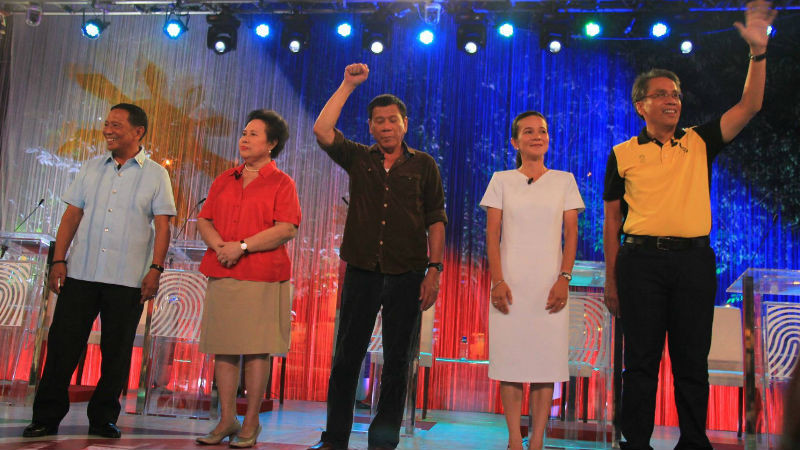The last presidential debate

Five candidates, one stage, one elections for the future of 100 million Filipinos. Photo by Inquirer Volunteer Gail Mejia | University of Pangasinan
IF THE PRESIDENCY were something that could be won in a town hall debate, it would be fairly easy to pick out the next President based on Sunday’s final debate. Mar Roxas would come out on top of my list as the best debater, way ahead of the others.
Grace Poe would be second, followed by Miriam Defensor-Santiago. Jojo Binay and Rody Duterte would bring up the tail end. This, of course, is a subjective view, but I can explain its basis.
I was looking basically for three things: communicative rationality, a wholistic mind and personal integrity.
By communicative rationality, I mean straightforward responses to difficult issues and questions—instead of an evasive glibness that stands in the place of thought.
By a wholistic mind, I mean a solid grasp of the nation’s current situation as shown by an almost compulsive need to connect the dots regardless of the specific issue at hand—instead of stock answers drawn from executive summaries.
And, by personal integrity, I mean visible proof of a personal philosophy appropriate to a Filipino President who aspires to lead and represent our young nation in these complex times.
But in the world of politics, performance in debates seldom figures as a deciding factor in electoral outcomes. Audiences watch these debates selectively, mainly to confirm images they have already formed in their minds.
Thus, unless a statement is so flagrantly wrong or stupid that there is no way of discounting it as a harmless joke, it is the overall perception of the candidate that usually prevails.
Roxas projected an intelligent and sober grasp of the issues, while Poe conveyed earnest compassion for those left out in the development process.
Binay and Duterte tried to personify decisiveness and willfulness, while Santiago tried vainly to maintain a stern professorial image.
No easy consensus
These perceptions are necessarily a function of what we think fundamentally ails the nation.
Is it, as Roxas believes, the need for a sustained and coherent program aimed at getting the country out of the trap of poverty and underdevelopment? Is it the lack of sensitivity and concern for the marginalized and underprivileged that Poe bewails?
Or, is it—as Binay and Duterte keep harping—the shameful absence of heroic leadership that can carry out decisions and protect the people? Or, finally, is it, as Santiago sees it, the lack of academic and moral wisdom in the leadership?
There is no easy consensus on what the country needs at this time. But my sense is that the public is in the grip of a panic over the government’s seeming failure to protect ordinary people from the menace of petty criminals, and to provide adequate services and facilities basic to the normal conduct of daily life.
This accounts for the resurgent appeal of the strongman that Binay was able to deploy early in the campaign but which Duterte has since dramatically seized from him.
Defining moments
In the debate at Phinma University of Pangasinan, I thought that the most defining moments were those in which the candidates were asked to give their opening and closing statements.
Santiago was the first to speak. The question was: How would you describe the Philippines at the end of your six-year term? She opened with a burst of three forceful sentences, giving the audience a glimpse of her signature feistiness. Then she paused, as though something invisible had severed her line of thought. This long, inexplicable lapse was repeated a few more times.
When she resumed speaking, it was already with a diffident voice. Those awkward silences, magnified on the TV screen as dead air, unfortunately shadowed her for the rest of the evening.
Setting the mood
Perhaps they even set the mood of the rest of the debate. It was a subdued Duterte who spoke next, rambling about correcting injustice, cleaning up government and not being afraid to copy the programs and plans of his rivals. “I’ve been copying since I was in Grade 1,” he said in self-deprecation, eliciting some laughter.
But gone was the reckless rhetoric with which he roused his audiences in the previous debates. This time he sounded almost as if he was determined to try speaking in measured presidential tones.
Binay came next, promising to build more health centers and hospitals, create jobs in an economy bursting with investments, under a decisive and competent government.
Poe followed Binay, starting off on a nostalgic note about her family’s Pangasinan roots. She then proceeded to enumerate the priorities that would bring forth a more equitable and compassionate society.
Roxas’ opening statement was a thoughtful meditation on the kind of society he wished to see at the end of his presidency. With an economy of words, he ticked off quantitative targets in various areas, using well-chosen phrases to round off his vision of “a nation that is free to dream.” One could sense the care with which these ideas were put together to form a coherent whole.
The rest of the debate resonated the somber tones of these opening statements. In the segments that followed, living profiles of what it is like to be poor in this country were brought out, and the candidates were invited to respond. This format was first used in the “Mang Pandoy” portion of the 1992 presidential debate, which I had the honor to moderate.
But if an entire program is mounted on this format, the tendency is for the discussants to offer quick fixes that address urgent needs, rather than spend time tackling the more complex systemic issues that lie at the heart of these everyday problems. This makes for a rather shallow discussion of the nation’s challenges.
Other than that, I thought ABS-CBN and the Commission on Elections did a great job in tempering animosities and raising the level of public discourse.
* * *















